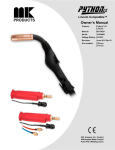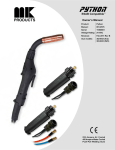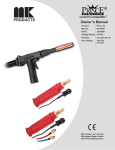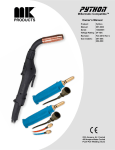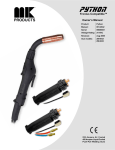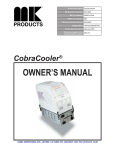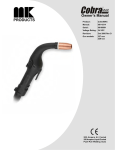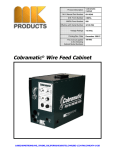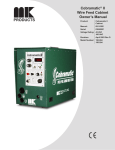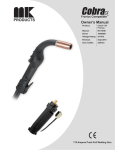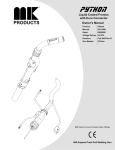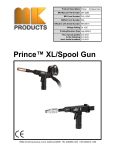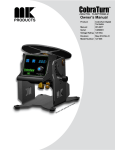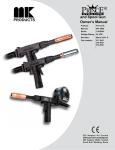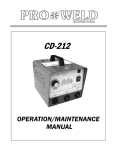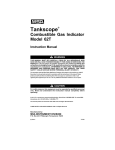Download Owner`s Manual
Transcript
Owner’s Manual Product: Python Manual: 091-0580 Serial: 12010001 Voltage Rating: 24 VDC Revision: Jan 2012 Rev C Gun models: 234-xxx 235-xxx 225 Ampere Air Cooled 450 Ampere Water Cooled Push-Pull Welding Guns Table of Contents Safety Considerations.........................................................................i-iii Installation................................................................................ Section A Technical Specifications......................................................................................1 Support Equipment Required..............................................................................1 Coolant Recommendations.................................................................................1 Gun Lead Connections.......................................................................................1 Operation..................................................................................Section B General...............................................................................................................2 Controls and Settings..........................................................................................2 Trigger Adjustment..............................................................................................2 Drive Roll and Idler Rolls....................................................................................3 Accessories..............................................................................Section C Optional Kits........................................................................................................4 Conduits..............................................................................................................4 Snake Skins........................................................................................................4 Contact Tips........................................................................................................5 Gas Cups............................................................................................................5 Barrels.................................................................................................................6 Maintenance.............................................................................Section D Periodic Maintenance.........................................................................................7 Recommended Spare Parts List.........................................................................7 Troubleshooting........................................................................Section E Troubleshooting Guide........................................................................................9 Testing The Gun..................................................................................................9 Appendices...............................................................................Section F Diagrams / Parts List......................................................................................... 11 Mechanical........................................................................................................12 Electrical...........................................................................................................25 Safety Warnings Warranty Declaration of Conformity for European Community (CE) Products Note This information is provided for units with CE certification (see rating label on unit). Manufacturer’s Name: MK Products, Inc. 16882 Armstrong Ave. Irvine, CA 92606 Declares that the product: Python® conforms to the following Directives and Standards: Directives Low Voltage Directive: 2006/95/EC Electromagnetic Compatibility (EMC) Directive: 2004/108/EC Standards Electromagnetic Compatibility, (EMC): EN 60974-10: 2007 Torches And Guns For Arc Welding, EN 60974-7: 2005 Safety Considerations ELECTRIC ARC WELDING EQUIPMENT CAUTION : READ BEFORE ATTEMPTING INSTALLATION, OPERATION OR MAINTENANCE OF THIS EQUIPMENT 1-1 INTRODUCTION This equipment is intended for ultimate application by commercial/industrial users and for operation by persons trained and experienced in the use and maintenance of welding equipment. Operation should not be undertaken without adequate training in the use of such equipment. Training is available from many public and private schools or similar facilities. Safe practices in the installation, operation and maintenance of this equipment requires proper training in the art, a careful study of the information provided with the equipment, and the use of common sense. Rules for safe use are generally provided by suppliers of welding power sources, compressed gas suppliers, and electrode suppliers. Careful compliance with these rules will promote safe use of this equipment. The following Safety Rules cover some of the more generally found situations. READ THEM CAREFULLY. In case of any doubt, obtain qualified help before proceeding. 1-2 GENERAL PRECAUTIONS A. Burn Prevention ELECTRIC ARC WELDING PRODUCES H I G H I N T E N S I T Y H E AT A N D ULTRAVIOLET RADIANT ENERGY WHICH MAY CAUSE SERIOUS AND PERMANENT EYE DAMAGE AND WHICH MAY DAMAGE ANY EXPOSED SKIN AREAS. Wear helmet with safety goggles or glasses with side shields underneath, appropriate filter lenses or plates (protected by clear cover glass). This is a must for welding or cutting (and chipping) to protect the eyes from radiant energy and flying metal. Replace cover glass when broken, pitted, or spattered. Medical first aid and eye treatment. First aid facilities and a qualified first aid person should be available for each shift unless medical facilities are close by for immediate treatment of flash burns of the eyes and skin burns. Wear protective clothing - leather (or asbestos) gauntlet gloves, hat, and high safety-toe shoes. Button shirt collar and pocket flaps, and wear cuffless trousers to avoid entry of sparks and slag. Avoid oily or greasy clothing. A spark may ignite them. Flammable hair preparations should not be used by persons intending to weld or cut. Hot metal such as electrode stubs and work pieces should never be handled without gloves. Ear plugs should be worn when working on overhead or in a confined space. A hard hat should be worn when others work overhead. B. Toxic Fume Prevention WARNING: The use of this product may result in exposure to chemicals known to the State of California to cause cancer and birth defects or other reproductive harm. Adequate ventilation. Severe discomfort, illness or death can result from fumes, vapors, heat, or oxygen enrichment or depletion that welding (or cutting) may produce. Prevent them with adequate ventilation. NEVER ventilate with oxygen. Lead-, cadmium-, zinc-, mercury-, beryllium-bearing and similar materials, when welded or cut, may produce harmful concentrations of toxic fumes. Adequate local exhaust ventilation must be used, or each person in the area, as well as the operator, must wear an air-supplied respirator. For beryllium, both must be used. Metals coated with or containing materials that emit toxic fumes should not be heated unless coating is removed form the work surface, the area is well ventilated, or the operator wears an air-supplied respirator. Work in a confined space only while it is being ventilated and, if necessary, while wearing an air-supplied respirator. Gas leaks in a confined space should be avoided. Leaked gas in large quantities can change oxygen concentration dangerously. Do not bring gas cylinders into a confined space. short circuits. If combustibles are in area, do NOT weld or cut. Move the work if practicable, to an area free of combustibles. Avoid paint spray rooms, dip tanks, storage areas, ventilators. If the work cannot be moved, move combustibles at least 35 feet away, out of reach of sparks and heat; or protect against ignition with suitable and snug-fitting, fire-resistant covers or shields. Walls touching combustibles on opposite sides should not be welded on (or cut). Walls, ceilings, and floor near work should be protected by heat-resistant covers or shields. Fire watcher must be standing by with suitable fire extinguishing equipment during and for some time after welding or cutting if: 1. Appreciable combustibles (including building construction) are within 35 feet. 2. Appreciable combustibles are further than 35 feet, but can be ignited by sparks. 3. Openings (concealed or visible) in floors or walls within 35 feet may expose combustibles to sparks. 4. Combustibles adjacent to walls, ceilings, roofs, or metal partitions can be ignited by radiant or conducted heat. Leaving confined space, shut OFF gas supply at source to prevent possible accumulation of gases in the space if downstream valves have been accidentally opened or left open. Check to be sure that the space is safe before reentering it. Hot work permit should be obtained before operation to ensure supervisor’s approval that adequate precautions have been taken. Vapors from chlorinated solvents can be decomposed by the heat of the arc (or flame) to form PHOSGENE, a highly toxic gas, and other lung and eye irritating products. The ultraviolet (radiant) energy of the arc can also decompose trichloroethylene and perchloroethylene vapors to form phosgene. DO NOT WELD or cut where solvent vapors can be drawn into the welding or cutting atmosphere or where the radiant energy can penetrate to atmospheres containing even minute amounts of trichloroethylene or perchloroethylene. An empty container that held combustibles, or that can produce flammable or toxic vapors when heated, must never be welded on or cut, unless container has first been cleaned in accordance with industry standards. C. Fire and Explosion Prevention Causes of fire and explosion are: combustibles reached by the arc, flame, flying sparks, hot slag, or heated material, misuse of compressed gases and cylinders, and short circuits. BE AWARE THAT flying sparks or falling slag can pass through cracks, along pipes, through windows or doors, and through wall or floor openings, out of sight of the goggled operator. Sparks can fly many feet. To prevent fires and explosion: Keep equipment clean and operable, free of oil, grease, and (in electrical parts) of metallic particles that can cause Python® Owner's Manual Page i After work is done, check that area is free of sparks, glowing embers, and flames. This includes: a thorough steam or caustic cleaning (or a solvent of water washing, depending on the combustible’s solubility), followed by purging and inerting with nitrogen or carbon dioxide, and using protective equipment. Water-filling just below working level may substitute for inerting. A container with unknown contents should be cleaned (see paragraph above). Do NOT depend on sense of smell or sight to determine if it is safe to weld or cut. Hollow castings or containers must be vented before welding or cutting. They can explode. Explosive atmospheres. NEVER weld or cut where the air may contain flammable dust, gas, or liquid vapors (such as gasoline). D. Compressed Gas Equipment The safe handling of compressed gas equipment is detailed in numerous industry publications. The following general rules cover many of the most common situations. 1. Pressure Regulators Regulator relief valve is designed to protect only the regulator from overpressure; it is not intended to protect any downstream equipment. Provide such protection with one or more relief devices. Never connect a regulator to a cylinder containing gas other than that for which the regulator was designed. Remove faulty regulator from service immediately for repair (first close cylinder valve). The following symptoms indicate a faulty regulator: Leaks - if gas leaks externally. Excessive Creep - if delivery pressure continues to rise with downstream valve closed. Faulty Gauge - if gauge pointer does not move off stop pin when pressurized, nor returns to stop pin after pressure release. Repair. Do NOT attempt repair. Send faulty regulators for repair to manufacturer’s designated repair center, where special techniques and tools are used by trained personnel. 2. Cylinders Cylinders must be handled carefully to prevent leaks and damage to their walls, valves, or safety devices: Avoid electrical circuit contact with cylinders including third rails, electrical wires, or welding circuits. They can produced short circuit arcs that may lead to a serious accident. (See 1-3C) ICC or DOT marking must be on each cylinder. It is an assurance of safety when the cylinder is properly handled. Identifying gas content. Use only cylinders with name of gas marked on them; do not rely on color to identify gas content. Notify supplier if unmarked. NEVER DEFACE or alter name, number, or other markings on a cylinder. It is illegal and hazardous. Empties: Keep valves closed, replace caps securely; mark MT; keep them separate from FULLS, and return promptly. Prohibited use. Never use a cylinder or its contents for other than its intended use, NEVER as a support or roller. Locate or secure cylinders so they cannot be knocked over. Passageways and work areas. Keep cylinders clear of areas where they may be stuck. to exceed 55 degrees C (130 degrees F.) Cool with water spray where such exposure exists. Protect cylinders, particularly valves from bumps, falls, falling objects, and weather. Replace caps securely when moving cylinders. Stuck valve. Do NOT use a hammer or wrench to open a cylinder valve that cannot be opened by hand. Notify your supplier. Mixing gases. NEVER try to mix any gases in a cylinder. NEVER refill any cylinder. Cylinder fittings should never be modified or exchanged. 3. Hose Prohibited use. Never use hose other than that designed for the specified gas. A general hose identification rule is: red for fuel gas, green for oxygen, and black for inert gases. Use ferrules or clamps designed for the hose (not ordinary wire or other substitute) as a binding to connect hoses to fittings. No copper tubing splices. Use only standard brass fittings to splice hose. Avoid long runs to prevent kinks and abuse. Suspend hose off ground to keep it from being run over, stepped on, or otherwise damaged. Coil excess hose to prevent kinks and tangles. Protect hose from damage by sharp edges, and by sparks, slag, and open flame. Examine hose regularly for leaks, wear, and loose connections. Immerse pressured hose in water; bubbles indicate leaks Repair leaky or worn hose by cutting area out and splicing. Do NOT use tape. 4. Proper Connections Clean cylinder valve outlet of impurities that may clog orifices and damage seats before connecting regulator. Except for hydrogen, crack valve momentarily, pointing outlet away from people and sources of ignition. Wipe with a clean, lintless cloth. Match regulator to cylinder. Before connecting, check that the regulator label and cylinder marking agree, and that the regulator inlet and cylinder outlet match. NEVER Connect a regulator designed for a particular gas or gases to a cylinder containing any other gas. Transporting cylinders. With a crane, use a secure support such as a platform or cradle. Do NOT lift cylinders off the ground by their valves or caps, or by chains, slings, or magnets. Tighten connections. When assembling threaded connections, clean and smooth seats where necessary. Tighten. If connection leaks, disassemble, clean, and retighten, using properly fitting wrench. Do NOT expose cylinders to excessive heat, sparks, slag, and flame, etc. that may cause rupture. Do not allow contents Adapters. Use a CGA adapter (available from your supplier) between cylinder and regulator, if one is required. Use Python® Owner's Manual Page ii two wrenches to tighten adapter marked RIGHT and LEFT HAND threads. Regulator outlet (or hose) connections may be identified by right hand threads for oxygen and left hand threads (with grooved hex on nut or shank) for fuel gas. 5. Pressurizing Steps: Drain regulator of residual gas through suitable vent before opening cylinder (or manifold valve) by turning adjusting screw in (clockwise). Draining prevents excessive compression heat at high pressure seat by allowing seat to open on pressurization. Leave adjusting screw engaged slightly on single-stage regulators. Stand to side of regulator while opening cylinder valve. Open cylinder valve slowly so that regulator pressure increases slowly. When gauge is pressurized (gauge reaches regulator maximum) leave cylinder valve in following position: for oxygen and inert gases, open fully to seal stem against possible leak; for fuel gas, open to less than one turn to permit quick emergency shut-off. Use pressure charts (available from your supplier) for safe and efficient recommended pressure settings on regulators. Check for leaks on first pressurization and regularly thereafter. Brush with soap solution. Bubbles indicate leaks. Clean off soapy water after test; dried soap is combustible. E. User Responsibilities Follow all Safety Rules. Remove leaky or defective equipment from service immediately for repair. Read and follow user manual instructions. F. Leaving Equipment Unattended Close gas supply at source and drain gas. G. Rope Staging-Support Rope staging-support should not be used for welding or cutting operation; rope may burn. 1-3 ARC WELDING Comply with precautions in 1-1, 1-2, and this section. Arc Welding, properly done, is a safe process, but a careless operator invites trouble. The equipment carries high currents at significant voltages. The arc is very bright and hot. Sparks fly, fumes rise, ultraviolet and infrared energy radiates, weldments are hot, and compressed gases may be used. The wise operator avoids unnecessary risks and protects himself and others from accidents. A. Burn Protection Comply with precautions in 1-2. The welding arc is intense and visibly bright. Its radiation can damage eyes, penetrate lightweight clothing, reflect from light-colored surfaces, and burn the skin and eyes. Skin burns resemble acute sunburn; those from gas-shielded arcs are more severe and painful. DON’T GET BURNED; COMPLY WITH PRECAUTIONS. 1. Protective Clothing Wear long-sleeve clothing in addition to gloves, hat, and shoes. As necessary, use additional protective clothing such as leather jacket or sleeves, flameproof apron, and fire-resistant leggings. Avoid outer garments of untreated cotton. Bare skin protection. Wear dark, substantial clothing. Button collar to protect chest and neck, and button pockets to prevent entry of sparks. 2. Eye and Head Protection Protect eyes from exposure to arc. Eyes may be damaged by radiant energy when exposed to the electric arc, even when not looking in the direction of the arc. Never look at an electric arc without protection. Welding helmet or shield containing a filter plate shade no. 12 or denser must be used when welding. Place over face before striking arc. Protect filter plate with a clear cover plate. Cracked or broken helmet or shield should NOT be worn; radiation can be passed through to cause burns. Cracked, broken, or loose filter plates must be replaced IMMEDIATELY. Replace clear cover plate when broken, pitted, or spattered. Flash goggles with side shields MUST be worn under the helmet to give some protection to the eyes should the helmet not be lowered over the face before an arc is struck. Looking at an arc momentarily with unprotected eyes (particularly a high intensity gas-shielded arc) can cause a retinal burn that may leave a permanent dark area in the field of vision. 3. Protection of Nearby Personnel Enclose the welding area. For production welding, a separate room or enclosed bay is best. In open areas, surround the operation with low-reflective, noncombustible screens or panels. Allow for free air circulation, particularly at floor level. Viewing the weld. Provide face shields for all persons who will be looking directly at the weld. Others working in area. See that all persons are wearing flash goggles. Before starting to weld, make sure that screen flaps or bay doors are closed. B. Toxic Fume Prevention Comply with precautions in 1-2B. Generator engine exhaust must be vented to the outside air. Carbon monoxide can kill. C. Fire and Explosion Prevention Comply with precautions in 1-2C. Equipment’s rated capacity. Do not overload arc welding equipment. It may overheat cables and cause a fire. Loose cable connections may overheat or flash and cause afire. Never strike an arc on a cylinder or other pressure vessel. It creates a brittle area that can cause a violent rupture or lead to such a rupture later under rough handling. D. Compressed Gas Equipment Comply with precautions in 1-2D. E. Shock Prevention Exposed electrically hot conductors or other bare metal in the welding circuit, or in ungrounded, electrically-HOT equipment can fatally shock a person whose body becomes a conductor. DO NOT STAND, SIT, LIE, LEAN ON, OR TOUCH a wet surface when welding without suitable protection. To protect against shock: Keep body and clothing dry. Never work in damp area without adequate insulation against electrical shock. Stay on a dry duckboard, or rubber mat when dampness or sweat cannot be avoided. Sweat, sea water, or moisture between body and an electrically HOT part or grounded metal - reduces the body surface electrical resistance, enabling dangerous and possibly lethal currents to flow through the body. 1. Grounding the Equipment When installing, connect the frames of each unit such as welding power source, control, work table, and water circulator to the building ground. Conductors must be adequate to carry ground currents safely. Equipment made electrically HOT by stray currents may shock, possibly fatally. Do NOT GROUND to electrical conduit, or to a pipe carrying ANY gas or a flammable liquid such as oil or fuel. Three-phase connection. Check phase requirement of equipment before installing. If only three-phase power is available, connect single-phase equipment to only two wires of the three-phase line. Do NOT connect the equipment ground lead to the third (live) wire, or the equipment will become electrically HOT - a dangerous condition that can shock, possibly fatally. Before welding, check ground for continuity. Be sure conductors are touching bare metal of equipment frames at connections. If a line cord with a ground lead is provided with the equipment for connection to a switch box, connect the ground lead to the grounded switch box. If a threeprong plug is added for connection to a grounded mating receptacle, the ground lead must be connected to the ground prong only. If the line cord comes with a three-prong plug, connect to a grounded mating receptacle. Never remove the ground prong from a plug, or use a plug with a broken ground prong. 2. Connectors Fully insulated lock-type connectors Python® Owner's Manual Page iii should be used to join welding cable lengths. 3. Cables Frequently inspect cables for wear, cracks, and damage. IMMEDIATELY REPLACE those with excessively worn or damaged insulation to avoid possibly lethal shock from bared cable. Cables with damaged areas may be taped to give resistance equivalent to original cable. Keep cable dry, free of oil and grease, and protected from hot metal and sparks. 4. Terminals and Other Exposed Parts Terminals and other exposed parts of electrical units should have insulating covers secured before operation. 5. Electrode Wire Electrode wire becomes electrically HOT when the power switch of gas metal-arc welding equipment is ON and welding gun trigger is pressed. Keep hands and body clear of wire and other HOT parts. 6. Safety Devices Safety devices such as interlocks and circuit breakers should not be disconnected or shunted out. Before installation, inspection, or service of equipment, shut OFF all power, and remove line fuses (or lock or red-tag switches) to prevent accidental turning ON of power. Disconnect all cables from welding power source, and pull all 115 volts line-cord plugs. Do not open power circuit or change polarity while welding. If, in an emergency, it must be disconnected, guard against shock burns or flash from switch arcing. Leaving equipment unattended. Always shut OFF, and disconnect all power to equipment. Power disconnect switch must be available near the welding power source. Section A Installation Technical Specifications Wire Capacity .030" - .045" (0.6mm - 1.2mm) solid hard wire, and cored wire .030" - 1/16" (0.8mm - 1.6mm) aluminum Wire Speed 800 IPM (20.3 mpm) max Duty Cycle - 60% All ratings are using Argon gas 225 Amps/25 Volts Air Cooled 450 Amps/25 Volts Water Cooled Support Equipment Required • C.V. or C.C. power source of sufficient capacity for your needs. • Regulated gas supply and hoses. • Properly sized power leads from power source to wire feeder and ground. • Water source and hose capable of providing a minimum of 1 quart (.95 liter) / min. at 45 p.s.i. when using water cooled guns. Coolant Recommendations Use Cobra Coolant (Aluminum Protection), P/N 931-0060. Cobra Coolant does not contain reactive sulphur or chlorine and does not react with copper, brass or aluminum. The coolant flow rate should be a minimum of 15 GPH (1 qt/min) between 35 and 45psi. Contact the re-circulator manufacturer for specifications on pressure. Gun Lead Connections Power Cable - Air Cooled A #2 power cable is used on the Python gooseneck gun. The gun end of the cable is stripped to the copper strands and wrapped with a copper strip. A setscrew holds the cable securely in the gun body with torque requirements of 55-60 in-lb. The cabinet end of the cable is equipped with a 1/2" ring lug which attaches to the top hole on the side of the power block. Supplied with this gun is a 3/8-16x5/8" bolt, a 3/8" spring lock washer and a 5/8" flat washer to attach the ring lug to the power block. Power Cable - Water Cooled Python water cooled gun utilizes a power/water cable with a #6 AWG cable inside a 5/16” diameter hose. When water is used with this cable and the #10 water cooled gas cup (P/N 621-0065), the system is rated at 450 amps @ 60% duty cycle. The gun end is threaded into the gun body. These connections utilize a conductive sealant and are tightened with torque requirements of 100 + 5 IN-LB. Python® Owner's Manual - Page 1 Conduit The Python gun comes standard with a poly-lined conduit, for feeding aluminum wire. The longer fitting with a shallow groove is used on the gun end. A set screw located on top of the gun handle secures the conduit in place. Gas Hose The gas hose is pushed over a barbed fitting on the end of the gun body and secured by twisting the hose retainer to the end of the hose (shown below). The hose retainer is re-usable and can be removed and re-installed as needed.The cabinet end of the gas hose uses our standard gas fitting (1/8” 27 nps). Water Hose If so equipped; The gas hose is pushed over a barbed fitting on the end of the gun body and secured by twisting the hose retainer to the end of the hose. The hose retainer is re-usable and can be removed and re-installed as needed. The other end is connected to the center fitting on the power block. Electric Cable A multi-conductor control cable is used on the Python.The gun end of the cable is secured with a cable clamp and the wires are connected to the potentiometer, the micro switch, the motor and the gun body mechanically. Slack is left in the electric cable as it exits the back of the gun to prevent cable and/or wire breakage. The cabinet end has a seven pin "W" clocked amphenol connector. Section B Operation General The Python gun maintains a constant, steady, uniform wire feed speed, regardless of curved or looped wire conduit. The constant push exerted by the slave motor in the cabinet, combined with the pull of the gun motor, causes the wire to literally float friction-free through the wire conduit. The 24VDC gun motor is controlled by a three and three-quarter (3 3/4) turn potentiometer in the gun handle. Controls and Settings Potentiometer The laterally-positioned potentiometer is located in the lower end of the handle, providing up to 800 ipm with 3 3/4 turns. Micro Switch The micro switch assembly consists of the micro switch, and leads. Trigger Sensitivity The amount of trigger lever travel can be shortened for a quicker or more responsive action. A more sensitive trigger lever is produced by reducing the gap between the trigger lever and the micro switch lever. By turning-in the trigger sensitivity adjustment screw, it closed the gap between the trigger lever and the micro switch lever. This will enable the operator to increase the sensitivity of the trigger lever. Python® Owner's Manual - Page 2 Sensitivity Adjustment With the wire feeder turned on (with or without welding wire loaded), turn the screw in until the micro-switch is activated. Once activated, the gun and wire feeder motors will begin feeding wire. Retract the screw accordingly until the system is deactivated and adjusted to the operators' liking. Drive Roll and Idler Rolls General The Python gun comes standard with a knurled drive roll and a grooved idler roll, which will handle both hard wire and aluminum wire with diameters from .030 to 1/16 inch and steel from .030 to .045 inches. Optional insulated V-groove drive rolls are also available for aluminum wire if desired (see optional kits). Drive roll tension is accomplished with a unique spring-loaded pressure screw. The Python comes from the factory with the pressure adjustment screw preset. NO ADJUSTMENT is required for all sizes and types of wires. Drive Roll Installation/Removal Note: Neither of the handles needs to be removed to access the drive or idler rolls. Cam Lever 1. Pull the cam lever away from the idler roll. This will relieve the pressure against the drive roll (as shown in Figure 1). 2. Align the drive roll removal tool (P/N 9310100) over the flats of the drive roll (as shown in Figure 2). Hold the gun with one hand or on a table top, with the other hand give the removal tool a quick snap-turn in the CLOCKWISE DIRECTION. 3. Once the drive roll is loose, continue to spin drive roll in the clockwise direction to remove the drive roll from the gun. Figure 1 Figure 2 4. Install a new drive roll on the left-hand threaded shaft. The drive roll will self-tighten when it is feeding wire. Idler Roll Installation and Removal (Reference Figure 3) 1. Using a slot type screwdriver, loosen idler screw, taking care not to lose lock washer under idler roll. 2. Insert new idler roll and lock washer onto screw, insuring that idler groove is toward top and lock washer is beneath. 3. Tighten. Figure 3 NOTE: Lock washer must be under idler roll or it will not turn freely. Python® Owner's Manual - Page 3 Section C Accessories A gas flow control mechanism (i.e. solenoid or valve) is required so the Python can be used on Cobra wire feeders. The following kits are available depending on the wire feeder used. The factory set times (in seconds) for normal and latched trigger functions is 0.5 pre-purge and 1.0 post-purge. Gas/Trigger Control Kit, 115V......................................................... 005-0713 Gas/Trigger Control Kit, 42V............................................................ 005-0714 Optional Kits Insulated Drive Roll Kits are used to prevent preheating of the aluminum wire which may soften it and clog the liner. This picking up of current at the drive rolls rather than at the contact tip is usually not a problem unless using too large of a contact tip or excessively oxidized aluminum wire. Insulated Grooved Drive Roll Kit................................................... 005-0640 For .030" (0.8mm) dia. aluminum wire. Includes insulated groove drive roll and insulated idler roll assy. Insulated Grooved Drive Roll Kit................................................... 005-0716 For .035" (0.9mm) dia. aluminum wire. Includes insulated groove drive roll and insulated idler roll assy. Insulated Grooved Drive Roll Kit................................................... 005-0717 For .040" (1.0mm) dia. aluminum wire. Includes insulated groove drive roll and insulated idler roll assy. Insulated Grooved Drive Roll Kit....................................................005-0718 For 3/64" (1.2mm) dia. aluminum wire. Includes insulated groove drive roll and insulated idler roll assy. Insulated Grooved Drive Roll Kit....................................................005-0719 For .062" (1.6mm) dia. aluminum wire. Includes insulated groove drive roll and insulated idler roll assy. Handle Kit..........................................................................................005-0699 Includes left and right handles, screws and drive roll door. Trigger Kit..........................................................................................005-0694 Trigger kit includes a spring and sensitivity adjustment screw replacement for all Python/CobraMAX™ guns. Micro Switch Kit................................................................................005-0701 Replacement micro switch assembly for all Python/CobraMAX™ guns. Potentiometer Kit..............................................................................005-0695 Replacement potentiometer assembly for all Python/CobraMAX™ guns. Barrel Insulator Replacement Kit....................................................005-0696 Includes replacement barrel insulator and taper lock nut. Conduits Flat spiral steel conduit for steel & cored wire. 615-0208.......................................................................................... 15 ft./4.5m 615-0216.......................................................................................... 25 ft./7.6m 615-0219........................................................................................ 35 ft./10.7m 615-0218........................................................................................ 50 ft./15.2m Snake Skins Snake Skin protective covers are now standard on all guns. You may order spare replacement covers to protect the lead assy of the gun when the factory one becomes damaged or worn. It can easily be replaced in the field by means of Velcro©. Snake Skin Cover 13ft (for 15ft leads).........................................931-0110 Snake Skin Cover 23ft (for 25ft leads)........................................ 931-0122 Snake Skin Cover 33ft (for 35ft leads)........................................ 931-0132 Snake Skin Cover 48ft (for 50ft leads)........................................ 931-0123 Python® Owner's Manual - Page 4 Contact Tips To remove contact tip when using full water cooled gas cup (P/N 621-0065), contact tip removal tool (P/N 931-0044) must be used. Wire Size Heavy Duty Contact Tip - 3/8" Diameter* Tip ID .030” (0.8mm) .041” (1.0mm) .035” (0.9mm) Arc Tip Length .044” (1.1mm) Spray Short Spray 1.57” (39.9mm) 1.82” (46.2mm) 1.57” (39.9mm) .035" (0.9mm) .044" (1.1mm) .045" (1.1mm) .053" (1.35mm) 3/64” (1.2mm) .053” (1.35mm) Short Short Spray 1.82” (46.2mm) 1.82” (46.2mm) 1.57” (39.9mm) Part No. 621-0390-25 621-0396-25 621-0391-25 621-0391-250† 621-0391-500†† 621-0397-25 621-0398-25 621-0392-25 621-0392-250† 3/64” (1.2mm) .060” (1.5mm) Spray 1.57” (39.9mm) 1/16” (1.6mm) .074” (1.9mm) .085” (2.16mm) Spray Spray 1.57” (39.9mm) *Use of tip removal tool is recommended **This size tip furnished with gun † 621-0392-500†† 621-0393-25** 621-0393-250† 621-0393-500†† 621-0394-25 621-0395-25 Also sold in quantities of 250 Also sold in quantities of 500 †† Spring Loaded Contact Tip - 3/8” Diameter Wire Size Tip ID Arc Tip Length Qty Part Number .030” (0.8 mm) .035” (0.9 mm) .041” (1.0 mm) .044” (1.1 mm) Spray 1.57” (39.9 mm) EA Spray 1.57” (39.9 mm) EA 621-0331 621-0332 3/64” (1.2 mm) 1/16” (1.6 mm) .060” (1.5 mm) .074” (1.9 mm) Spray 1.57” (39.9 mm) EA Spray 1.57” (39.9 mm) EA 621-0334 621-0335 3/8" Diameter Flex Barrel Tip - Recommended for Flex Barrel* Wire Size .030” (0.8 mm) .035” (0.9 mm) .045" (1.1mm) 3/64” (1.2 mm) Tip ID Arc Tip Length .041” (1 mm) .044” (1.1 mm) .053" (1.37 mm) .060” (1.5 mm) Spray Spray Short Spray 1.0” (25.4 mm) 1.0” (25.4 mm) 1.0” (25.4 mm) 1.0” (25.4 mm) Qty Part Number EA EA EA EA 621-0480-25 621-0481-25 621-0482-25 621-0483-25 * Used with Flex Barrel cups 621-0465 and 621-0466, on Air Cooled models only Finned Copper Cups Cup Size Finned Copper Gas Cups Cup I.D. Part No. No. 6 No. 8 No. 10 3/8” (9.5mm) 1/2” (12.7mm) 5/8” (15.8mm) 621-0248 621-0249 621-0250* Cup Size 10 12 Cup I.D. 5/8" (15.8mm) 3/4" (19.0mm) Part No. 621-0251 621-0252 Heavy Duty Finned Copper Gas Cups *Standard - furnished with Air Cooled gun Python® Owner's Manual - Page 5 Air Cooled Cup Water Cooled Cup Adapter Water Cooled Cup Air Cooled Cups for Python Water Cooled Gun Cup Size Cup I.D. No. 6 No. 8 No. 10 Part No. 3/8” (9.5mm) 1/2” (12.7mm) 5/8” (15.8mm) 621-0170 621-0159 621-0160 To use air cooled gas cups, you must use a cup retaining nut (449-0193) and a water cooled cup adapter (621-0101). Water Cooled Cups for Python Water Cooled Gun Cup Size Cup I.D. No. 10* *Standard - furnished with gun Cup Size Part No. 5/8” (15.9mm) 621-0065 Flex Barrel Gas Cups* 8 10 *Works with Air Cooled models only Cup I.D. 1/2” (12.7mm) 5/8" (15.8mm) Part No. 621-0465 621-0466 Tip Extender Part Number 931-0137 615-0338 621-0424 615-0250 Gun Barrel Liners Description Teflon liner package, 5 pieces Steel wire only, .030 - .1/16" (0.8 - 0.9mm) Python tip extender (Air cooled barrel only) Spiral steel liner for tip extender Barrel Assemblies 225 Amps Air Cooled, 60° (P/N 003-2272) Standard on AC 450 Amps Water Cooled, 60° (P/N 003-2317) Standard on WC 300 Amps Water Cooled (P/N 003-2380) Optional on WC 225 Amp Air/Water Cooled, 45° (P/N 003-2152) Optional on AC 200Amp Air Cooled Only (P/N 003-2495-12) Optional on AC Air Cooled The Python air cooled guns (234 series) come standard with a 60˚ curved barrel. The barrel assembly locks to the Python body using the patented EZ Lock™ system. Water Cooled The Python water cooled guns (235 series) come standard with a 60˚ curved water cooled barrel assembly. Optional 12” and 18” Straight and Curved Barrel Assemblies 12" Straight, Air Cooled Barrel Assembly........................................... 003-2332 12" Curved, 45° Air Cooled Barrel Assembly...................................... 003-2333 12” Straight, Water Cooled Barrel Assembly...................................... 003-2318 12” Curved, 45° Water Cooled Barrel Assembly................................. 003-2319 18" Straight, Air Cooled Barrel Assembly........................................... 003-2334 18" Curved, 45° Air Cooled Barrel Assembly...................................... 003-2335 18” Straight Water Cooled Barrel Assembly....................................... 003-2320 18” Curved, 45° Water Cooled Barrel Assembly................................. 003-2321 12” Flex Barrel Air Cooled Assembly............................................. 003-2495-12 Python® Owner's Manual - Page 6 18” Flex Barrel Air Cooled Assembly............................................. 003-2495-18 24" Flex Barrel Air Cooled Assembly............................................. 003-2495-24 36" Flex Barrel Air Cooled Assembly............................................. 003-2495-36 Barrel Removal and Installation Note: Turn off water circulator prior to loosening and removing barrels. To remove the barrel assembly, loosen the patented EZ Lock™ taper lock nut until it is clear of the threads. Pull barrel out of the gun body. To replace a barrel assembly, push the barrel assembly into the gun body until it clicks to a stop. To assure proper seating of the barrel, open the drive/ idler roll door in the top of the handle. The rear face of the barrel should now be flush with the gun body. Take care not to damage the “O” rings when inserting into the body. Tighten taper lock nut assembly firmly so that barrel cannot rotate. Barrel Rotation To rotate a barrel assembly, loosen the patented EZ Lock™ taper lock nut assembly no more than 1 turn. Rotate barrel to the position of your choice and retighten taper lock nut assembly firmly so that the barrel cannot rotate. WARNING: Do not attempt to weld without the barrel being tightly secured in the gun body, or damage to the barrel or body may result. Section D Maintenance Periodic Maintenance Your Cobramatic system is designed to provide years of reliable service. Maintenance of the gun will normally consist of a general cleaning of the wire guide system, including barrels, drive rolls, and conduits at regular intervals. Remove spatter build-up from inside of nozzles with a hardwood stick. The only parts on the Cobramatic system that are subject to normal wear are the conduit, contact tips, gas cups, front body liners, wire guides, drive and idler rolls. A supply of these parts should be maintained on hand. The number of units in operation and the importance of minimal down time will determine to what extent spare parts should be stocked on hand. See the recommended spare parts list for the most commonly replaced parts. If repairs do become necessary, qualified shop maintenance personnel can easily replace any part. Tool Maintenance Tools Contact Tip Removal Tool Drive Roll Removal Tool Qty. 1 1 1 1 2 2 1 2 10 5 Part Number 931-0044 931-0100 Recommended Spare Parts List Part No. 615-0601-15 615-0601-25 615-0601-35 615-0601-50 005-0694 005-0695 005-0699 005-0701 511-0101 005-0686 Description Conduit - 15 ft Conduit - 25 ft Conduit - 35 ft Conduit - 50 ft Trigger Assy Kit Potentiometer Assy Kit Handle Kit Micro-Switch Assy Kit Drive Roll Idler Roll Kit DRIVE ROLL REMOVAL TOOL 931-0100 KNURLED DRIVE ROLL 511-0101 IDLER ROLL 005-0686 MICRO SWITCH ASSY 005-0701 Python® Owner's Manual - Page 7 Section E Troubleshooting Trouble No wire feed at gun, feeder not operating, i.e. no slave motor or brake solenoid. No wire feed at gun, feeder operating properly. Wire feeds, but welding wire is not energized. Wire feeds erratically. Wire feeds one speed only. Wire walks out of drive rolls. Cause Input power fuse in feeder/control box blown Remedy Replace fuse. Micro-switch defective/not Replace switch. Check being activated switch for operation. Broken electrical cable Check micro-switch wires for continuity. Motor control fuse in feeder/control box blown Check motor leads for shorts; then replace fuse. Bad potentiometer Check potentiometer with meter. Broken electrical cable. Check motor and potentiometer wires for continuity. Bad speed control/PCB. See specific cabinet/ control box owner's manual for speed control operation. Loose or no cable connections. Check all power connections. Check power supply owner's manual for Contactor control cable location and type of loose or in wrong position contactor signal required, i.e. closing or 115VAC. Welding power source Check power source. Dirty or worn conduit Blow out or replace conduit. Wrong size contact tip See contact tip table. Idler roll stuck Check for lock washer under idler roll, or replace if damaged. Bad potentiometer Check with meter. Broken electrical cable Check potentiometer wires for continuity or short. Bad speed control See specific cabinet/ control owner's manual for speed control operation. Idler roll upside-down Place groove in idler roll toward top. Rear wire guide missing Replace wire guide. Python® Owner's Manual - Page 8 Troubleshooting Guide Regardless of which gun or feeder used, all MK Products’ push-pull guns operate on the same principle. The slave motor in the feeder runs at a fast,constant speed, but has very low torque. It is always trying to feed more wire than the gun motor wants, and when the motor gets all it wants, it slows the slave motor, preventing a bird’s nest. Because of the low torque produced by the slave motor, a brake system is used to prevent wire overrun rather than tension. The drag adjustment in the feeder is used simply to keep the wire slightly taut, so it will not pull off the spool while feeding wire. The high torque 24VDC gun motor is controlled by a solid state speed control located in the feeder, and a pot located in the gun. The gun motor, potentiometer, and micro switch are connected to the cabinet/control box via a control cable and Amphenol connector. If this cable becomes damaged, a variety of symptoms can occur, depending on which wire(s) break. To test, check each wire for continuity and shorts. Remember, the micro switch in the gun activates both the slave motor and gun motor circuits in the cabinet. Therefore, if the slave motor and brake solenoid operate, but the gun does not, look more toward the gun motor’s 24 V circuits, speed control, control cable, or the gun motor. If nothing operates, look more toward the slave motor’s input, micro switch leads, or micro switch. Testing The Gun Reference the "W" clocked gun wiring diagram on the Python electrical diagram for information about pin-outs and locations. Motor Check Remove the gun connector from the cabinet. Using the gun Amphenol connector, check the resistance across pins “A” and “B” (motor leads). If an open circuit (more than K ohms) or short exist (less than 2 ohms) exists, check the motor leads and motor independently. Testing the Potentiometer - “W” Clocked Using the gun amphenol connector, check the resistance across pin “D” (wiper) and pin “C”. The resistance should vary from 0 - 5K ohms as the potentiometer is turned. Check the resistance across pin “D” (wiper) and pin “G”. The resistance should vary from 5K - 0 ohms as the potentiometer is turned. Testing the Micro Switch Using the gun amphenol connector, check for continuity across pins “E” and “F” when the trigger is pressed. Python® Owner's Manual - Page 9 THIS PAGE INTENTIONALLY BLANK Section F Appendices Diagrams / Parts List Exploded View........................................................................... 12 Bill of Material............................................................................ 13 Front Body Assembly . .............................................................. 14 Rear Body Assembly, Air Cooled............................................... 15 Rear Body Assembly, Water Cooled.......................................... 16 Barrel Assembly, Air Cooled...................................................... 17 Barrel Assembly, Water Cooled................................................. 18 Cup Insulator and O-Ring Maintenance.................................... 19 Lead Assembly, Air Cooled........................................................ 20 Lead Assembly, Water Cooled................................................... 21 Spiral Wrap Installation.............................................................. 22 Electrical.................................................................................... 25 Python® Owner's Manual - Page 11 Python® Owner's Manual - page 12 Motor 211-0077 211-0080 1 Part No. 1 Qty Hi-Speed Standard Description Apply Thread Locking Compound to contact surface for installation Apply Compound grease to contact surface for installation Apply Compound Noalox to contact surface for installation 10 No. Python Head Assembly Air Cooled Water Cooled Python® Owner's Manual - page 13 003-2108 003-2271 1 1 1 1 3 4 003-2287 1 1 2 1 2 9 10 11 12 320-0101 319-0258 319-0254 SEE TABLE 003-2289 1 8 005-0695 1 7 003-2153 1 003-2125 005-0694 6 5 005-0701 1 2 002-0629 1 1 Part No. Qty. No. Scr Button 4-40 x 3/16 SST Scr FH Phil 82 4-40 5/8 SST Scr FH Phil 82 4-40 x 3/8 SST Motor 24VDC Rear Body Assy, W/C Rear Body Assy, A/C Assy Speed Control Pot Kit Assy Boot Torch Front Body Assy, A/C Front Body Assy, W/C Micro Swx Kit Assy Knob Pot Trigger Kit Assy Cam Idler Arm Description 25 24 23 22 21 20 19 18 17 16 15 14 13 No. 0.30 ft. 1 1 1 1 1 1 1 1 1 4 9 Qty. 737-0048 437-0268 437-0253 005-0699 435-1585 431-1637 431-1622 421-0018 405-0706 338-0153 333-0260 338-0022 Part No. Air Cooled and Water Cooled Head Assembly Tube, Insulation 9 AWG, Clear Cover Knob Python Door Molded Python Handle Kit: Includes line items 13,18, and 23 Strap Motor Python Screw Hex 3/8-20 x 3/8 Scr Shoulder 1/8 x 4-40 Pin Dowel 3/32 x 7/8 Label Scr SHC 1-72 x 3/8 SST Wshr Spr LK #6 SST Scr SHC 6-32 x 3/8 SST Description Python Front Body Assembly P/N 003-2271 (Air Cooled) P/N 003-2108 (Water Cooled) Front Body Assembly No. Qty. Part No. Description 1 - - 2 - - 3* 1 325-0206 10-24 x 3/8 PH Screw 4* 1 333-0082 # 10 Lock Washer 5 1 419-0092 0.29 x 0.047 x 0.32 Comp. Spring 6 1 421-0525 1/8 x 7/8 SST Dowel Pin 7 1 431-1663 Idler Adjusting Screw 8 1 431-1598 Idler Arm 9 1 511-0001* Idler Wire Feed Assembly 10 1 511-0101 Drive roll Not available separately * Items 3, 4 & 9 available as package kit: Part number 005-0686 Python® Owner's Manual - page 14 Python Rear Assembly - Air Cooled P/N 003-2289 apply silicone lubricant for installation Air Cooled Rear Body Assembly No. Qty. Part No. Description 1 - - Not available separately 2 2 303-0096 O-Ring .145 ID x .07 W 3 1 321-1082 Set Screw Flat 1/4-20 5/16 SST 4 1 321-1104 Set Screw Mod Conduit 5 1 336-0020 Scr PH Phil 4-40 x 5/16 SST 6 1 411-0243 Tie Wrap Scr 4 Python® Owner's Manual - page 15 Python Rear Assembly - Water Cooled P/N 003-2287 apply silicone lubricant for installation Water Cooled Rear Body Assembly No. Qty. Part No. Description 1 - - Not available separately 2 6 303-0096 O-Ring .145 ID x .07 W 3 1 321-1104 Set Screw Mod Conduit 4 1 336-0020 Scr PH Phil 4-40 x 5/16 SST 5 1 411-0243 Tie Wrap Scr 4 Python® Owner's Manual - page 16 Python Barrel Assembly - Air Cooled P/N 003-2272 *Apply silicone lubricant to items 4 and 5 before installing. Air Cooled 60º Curved Barrel Assembly No. Qty. Part Number Description 1 - - Not available separately 2 1 003-2213 Assy Taper Lock Barrel 3 1 261-0143 Insulator Barrel 4* 2 303-0010 O-Ring .489 ID x .07 W 5* 2 303-0094 O-Ring .301 ID x .07 W 6 1 313-0091 Retaining Ring 5/8 Shaft 7 1 431-1774 Cup Insulator Barrel 8 1 pkg. 931-0137 Barrel Liner PK, 5 pcs 9 1 621-0250 Assy Cup Copper Finned #10 10 1 621-0393 Tip HD Spray .060 Python® Owner's Manual - page 17 Python Barrel Assembly - Water Cooled P/N 003-2317 *Apply silicone lubricant to items 5, and 6 before installing. Water Cooled 60º Barrel Assembly No. Qty. Part No. Description 1 - - Not available separately 2 1 003-2213 Assy Taper Lock Barrel 3 1 261-0141 Insulator Barrel 4 1 261-0381 Insulator Cup with five O-Rings 5* 8 303-0010 O-Ring .489 ID x .07 W 6* 2 303-0094 O-Ring .301 ID x .07 W 7 1 313-0091 Retaining Ring 5/8 Shaft 8 1 431-0977 Retaining Nut 9 1 431-1774 Cup Insulator Barrel 10 1 pkg. 931-0137 Barrel Liner PK, 5 pcs 11 1 621-0065 Cup #10 Assy 12 1 621-0393 Tip HD Spray .060 Python® Owner's Manual - page 18 CUP INSULATOR AND O-RING MAINTENANCE CAUTION: Power-off the coolant pump before disassembling water-cooled barrels. 1. Unscrew Retaining Nut and slide back on barrel. 2. Using a firm pull and twist action, the Water-Cooled Gas Cup or Air-Cooled Gas Cup Assembly can be removed from the Cup Insulator. 3. Inspect the Cup Insulator and o-rings (included with Insulator) for wear and proper lubrication. It is considered good practice to replace all o-rings at the same time. 4. To remove the Cup Insulator, it must be unscrewed and pulled from the barrel. Use a rag or towel (due to o-ring lubrication) and wrap it around the Cup Insulator. Unscrew and pull when completed unthreaded from barrel. Be sure the Insulator is fully unscrewed from the threads. Pulling the Insulator over barrel threads will damage the threads on the Insulator. Inspect o-rings on barrel for wear and lubrication. It is considered good practice to replace all o-rings at the same time. 5. To install the Cup Insulator, it must be pushed all the way onto the barrel then screwed onto the threads. If necessary, place small amount of o-ring lubricant on the inside diameter of the Cup Insulator, this will help it slide onto the barrel. Push the Insulator onto the barrel until it bottoms out, screw onto barrel threads. The Insulator MUST be all the way onto the barrel to avoid assure proper coolant passage and from blocking the gas outlet orifices. 6. Push Water-Cooled Gas Cup or Chrome Nut, Cup Adapter and Gas Cup Assembly onto Cup Insulator. Slide Retaining Nut forward and tighten. Insulator Correct Installation Barrel Incorrect Installation Python® Owner's Manual - page 19 Python Lead Assembly - Air Cooled Lead Assembly - Air Cooled No. Qty. Description 15' Part No. 25' Part No. 35' Part No. 1 1 Wrap Spiral Cord 5.5" LG 261-0094 2 1 Wrap Spiral Cord 13" LG 261-0094-13 3 1 Snake Skin 931-0110 931-0122 931-0132 50' Part No. 931-0123 4 4 Tie Wrap 411-0045 5* 1 Hose Retainer, 5/16 431-1898 6 1 Assy Gas Hose 552-0242-15 552-0242-25 552-0242-35 552-0242-50 7 1 Assy Conduit 615-0601-15 615-0601-25 615-0601-35 615-0601-50 8 - - --- 1 Assy Power Cable A/C 1 Ultra Flex Power Cable (Optional) 843-0580-15 843-0580-25 843-0580-35 843-0580-50 10 1 Assy Controller Cable 11 1 SCR HX 3/8 - 16 x 5/8 ST 329-0054 12 1 Wshr Spr Lk #3/8 333-0011 9** 843-0630-15 843-0630-25 843-0630-35 843-0630-50 005-0690 005-0691 13 1 Wshr .391 x .875 x .063 BS * Hose Retainer is re-usable and can be removed and re-installed as needed ** Power Cable includes copper wrap P/N 701-0053-1 Python® Owner's Manual - page 20 005-0740 331-0777 005-0692 Python Lead Assembly - Water Cooled Lead Assembly - Water Cooled No. Qty. Description 15' Part No. 25' Part No. 35' Part No. 50' Part No. 1 1 Wrap Spiral Cord 5.5" LG 2 1 Wrap Spiral Cord 13" LG 3 1 Snake Skin 4 4 Tie Wrap 411-0045 5* 2 Hose Retainer, 5/16 431-1898 6 1 Assy Gas Hose 552-0242-15 552-0242-25 552-0242-35 552-0242-50 7 1 Assy Water Hose 552-0243-15 552-0243-25 552-0243-35 552-0243-50 8 1 Assy Conduit 615-0601-15 615-0601-25 615-0601-35 615-0601-50 9 - - 10 261-0094 261-0094-13 931-0110 Assy Controller Cable 931-0122 931-0132 931-0123 ---005-0690 005-0691 005-0740 11 1 Assy Power Cable W/C #6 005-0387-15 005-0387-25 005-0387-35 *Hose Retainer is re-usable and can be removed and re-installed as needed Python® Owner's Manual - page 21 005-0692 005-0387-50 Python Lead Assembly Spiral Wrap Installation 033-0929 Gun End, Air Cooled Conduit Spiral Wrap p/n: 261-0094-13 Power Cable Python® Owner's Manual - page 22 Python Lead Assembly Spiral Wrap Installation 033-0929 Gun End, Water Cooled Conduit Spiral Wrap p/n: 261-0094-13 Ring 431-1660 Power Cable Python® Owner's Manual - page 23 Python Lead Assembly Spiral Wrap Installation 033-0929 Cabinet End, Air and Water Cooled Spiral Wrap p/n: 261-0094 Python® Owner's Manual - page 24 A B G D C E F Cabinet End Amphenol Connector Python® Owner's Manual - page 25 White Green Blue Brown Yellow White Green Blue Brown Yellow Red Black Torch Lead Black Red 1 + 5K 2 3 - Torch Functions TORCH TRIGGER TORCH POT TORCH MOTOR Python Electrical Safety Warnings Python® Owner's Manual - page 26 Python® Owner's Manual - page 27 16882 Armstrong Ave. Irvine, CA 92606 Tel (949) 863-1234 Fax (949) 474-1428 www.mkproducts.com August 1, 2010 THIS PAGE INTENTIONALLY BLANK www.mkproducts.com 16882 Armstrong Ave. Irvine, California 92606 TEL (949) 863-1234 FAX (949) 474-1428






































